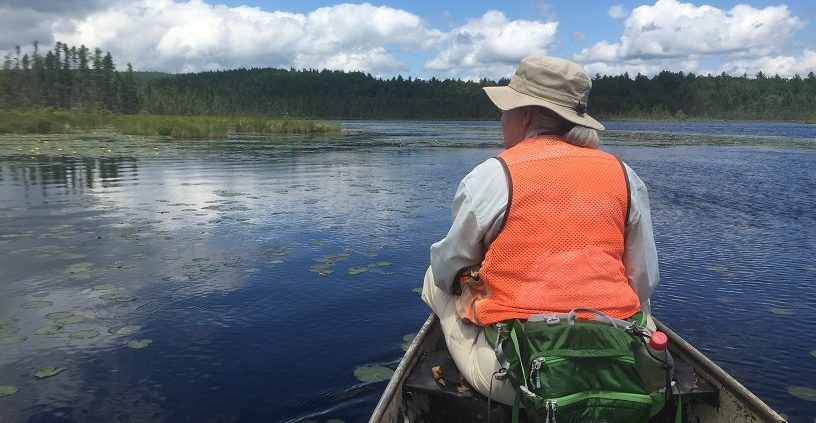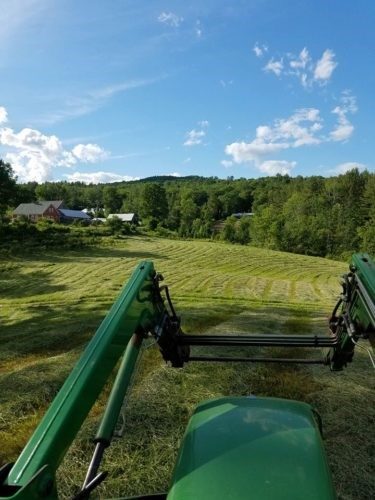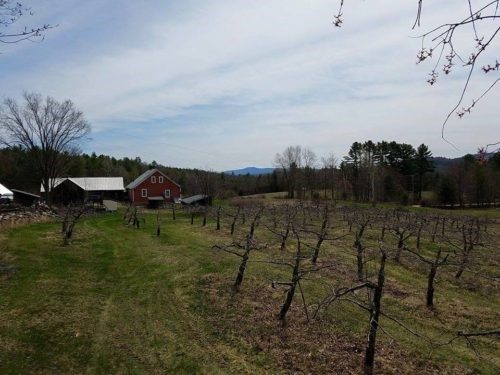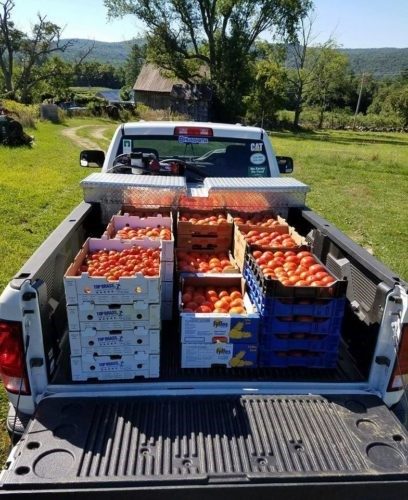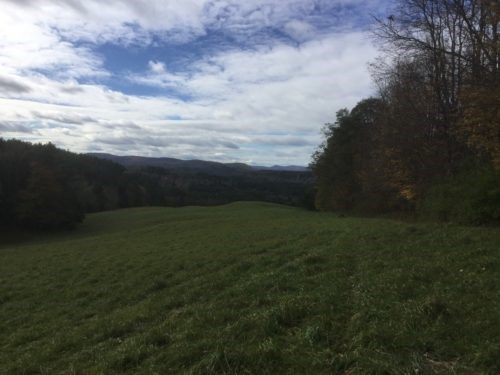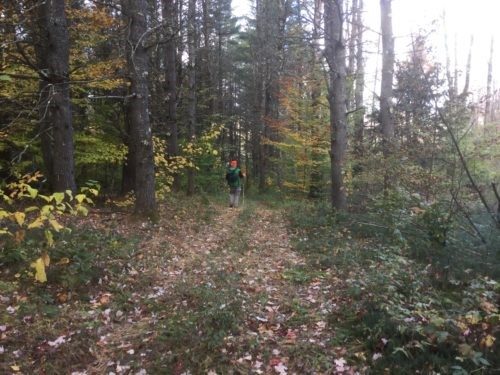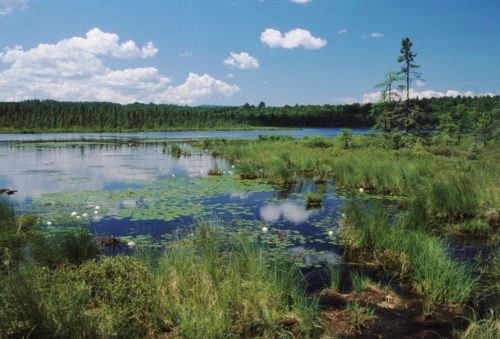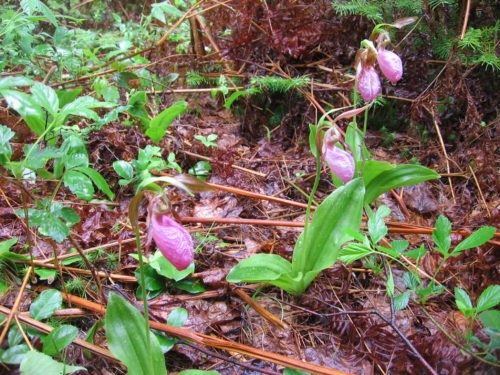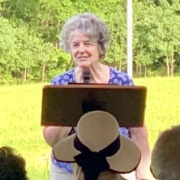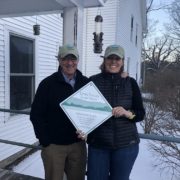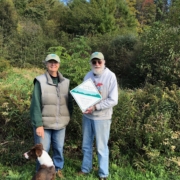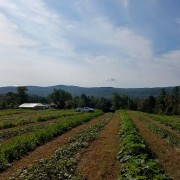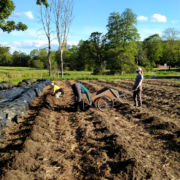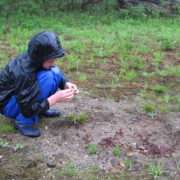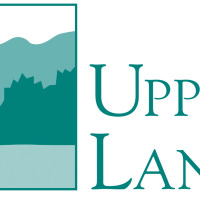We Have a Lot to Celebrate
June was a very busy month for Upper Valley Land Trust. When conservation projects are completed and documents are signed it’s always cause for celebration and excitement. June 12th was a day of much celebration — not one, not two, but three conservation transactions happened in rapid succession.
The first was Beaver Pond Farm in Newport, NH. You might remember our fundraising campaign late last year seeking 100 contributors of any amount to earn us matching funds needed to close the project (read more on that here). We received tremendous support for this project from Newport and surrounding communities, demonstrating just how beloved and vitally important Beaver Pond Farm is to this community.
Beaver Pond Farm has existed for over two centuries in the same family, going back to Revolutionary War veteran William Osgood, who founded the farm in 1780. Today the farm and farm stand are run by eighth generation farmers Becky and Ben Nelson. The Nelsons grow a variety of fruits and vegetables, while also producing hay, maple syrup, Christmas trees, and raising beef. From our recent firsthand experience, the pies sold at the farmstand, made by Becky’s mother, are to die for. This place has been a staple of the community for a long time, proving their ability to adapt and change with each passing decade.
The Nelsons decision to conserve the farm in order to support a sustainable transition to the next generation was part of the adaptability and forethought that has kept the farm running for so long. In Becky’s own words, “We decided to conserve our farm so that it can be an undeveloped spot in the community in perpetuity and to preserve our family agricultural heritage in an increasingly difficult environment for small farms and small business.”
In addition to the important cultural and economic significance the farm represents in the community, the land also boasts important conservation resources. More than half of this 244 acre property includes productive farm soils of state or federal significance. There are almost two acres of wetlands on the property and more than 2 miles of streams. 22 acres are of the highest ranked habitat in the biological region. The soil, water resources, and high habitat rank made this farm a uniquely important area to preserve into the future.
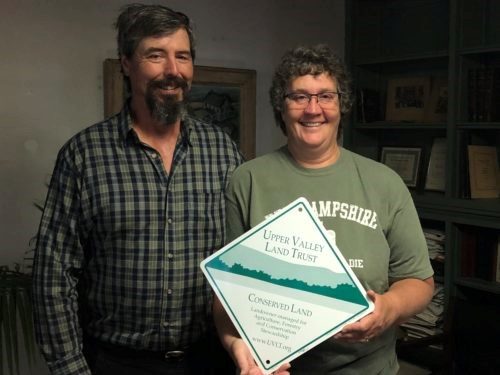
Ben and Becky Nelson moments after signing the documents to conserve their farm. Thank you, Ben and Becky!
Our second conservation transaction on June 12 brings us to Royalton, VT, 50 miles away and in another state, to the Frost-Pedersen property. Ellen Frost and Bill Pedersen had conserved 153 acres adjacent to their home there in 2000 but recently purchased another 40 acres of adjacent hilltop woodlands to add to their easement.
This entirely forested area consists of hemlock, beech, red maple, sugar maple, and pine trees. There is a snowmobile trail crossing the property, which stretches along the ridge following stone walls. An old foundation, known as the William Bowles House Site is buried deep in the woods. From the top of the hill, views of the White River Valley can be seen.
Finally, back in New Hampshire, the Mascoma Watershed Conservation Council (MWCC) signed a deed giving UVLT the 923 acre Bear Pond Natural Area and 13 acre Arzdorf properties in Canaan. The process was a testament to what a dedicated group of volunteers can accomplish. Almost 20 years ago, MWCC began the effort to raise $350,000 to purchase this tract at the headwaters of the Mascoma River and establish a stewardship endowment for the tract. When they bought the property in 2002, MWCC executed a conservation easement with UVLT. At that time, Bear Pond was the largest property under easement with UVLT.
In 2018 MWCC, with a core group of members almost unchanged from 2002, recognized that a time could come when their group might no longer be able to steward as thoughtfully and carefully as they would wish. In order to make sure the property that they loved and had preserved would remain taken care of forever, the group decided to convey the property to UVLT. On June 12th, the deed was signed and Bear Pond became UVLT’s newest conservation area.
Bear Pond Natural Area links the Mascoma State Forest and two other parcels of conservation land, creating a 1,500 acre tract of protected land on the north side of Route 4 that extends from Goose Pond Road to Switch Road. The Bear Pond Property is one of tremendous ecological diversity. Its 60-acre quaking bog harbors a number of rare plant species and is rated by New Hampshire’s Natural Heritage Inventory Program as “one of the best bogs in the state.” An alluvial meadow is home to woodcock and grassland birds, while an extensive rocky outcrop as high as 60 feet in some places serves as a nesting site for ravens. The property is also frequented by bear, moose, deer, bobcat, fisher, and wild turkey. The property’s location at the headwaters of the Mascoma River and its extensive water resources, 160 acres of wetlands, frontage on both Little Goose Pond and the Mascoma River, and Bear Pond itself, make it a crucial ground water recharge area for the Mascoma River, which is the sole water supply for the City of Lebanon and a possible back-up supply for Hanover.
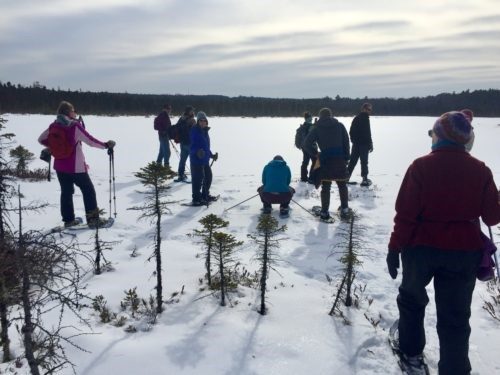
Each year, UVLT and MWCC host a snowshoe event, traversing the property and going over Bear Pond (2019).
Bear Pond is located in close proximity to two other UVLT Conservation Areas in East Hanover – The Dismal at Pressey Brook and the Tunis District Conservation Area.
We are grateful to the landowners of these properties for their forethought in protecting them for the future and their trust in UVLT to steward and uphold the easements. In addition we would like to acknowledge the Natural Resource Conservation Service, the 1772 Foundation in collaboration with the Land Trust Alliance, the Thomas W. Haas Fund of the New Hampshire Charitable Foundation, funds from the sale of the Conservation License plate (Moose Plate) through the NH State Conservation Committee grant program, and each and every donor who gave to our community fundraising campaign for their help protecting Beaver Pond Farm.

